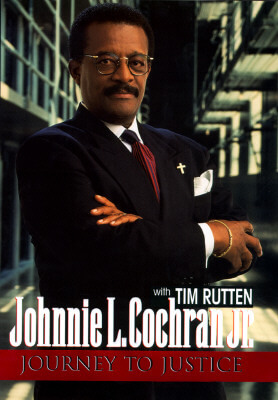Book Excerpt – Journey To Justice
Journey To Justice
by Johnnie Cochran
One World/Ballantine (Sep 30, 1996)
Fiction, Hardcover, 383 pages
More Info ▶
WHY I WANTED TO BE A LAWYER
I have often been asked why I wanted to be a lawyer. One of the most
important things that happened to me during my formative years occurred
in the spring of 1954. That May, in Washington, D.C., the United States
Supreme Court handed down its landmark decision in the case of Brown v.
Board of Education of Topeka, Kansas. Legal segregation with its
elaborate mythology of "separate but equal" public institutions for
blacks and whites was forever overthrown. I vividly recall how the
newspaper accounts
of the Court’s ruling fascinated me and how
carefully I pored over every image in the extensive coverage carried in the next
week’s photo magazines, Life and Look. Like so many other African Americans, I
was thrilled hat the Court’s opinion was unanimous, and will revere Chief
Justice Earl Warren and Justice William O. Douglas until the day I die for the
part they played in forging that consensus. The day in October of 1968 on which
I first was admitted to practice before those two great justices remains one of
the most memorable in my life.
But, to me, the most striking images of those exciting days in 1954 were the
pictures of the tall, handsome lawyer who had argued Brown before the Court. He
was Thurgood Marshall of the NAACP Legal Defense Fund. And he was a black man,
like me. More important, he had used the law and his storied skill and courage
as an advocate to change society for the better. He had made a difference for
all of us, black and white. Suddenly, I knew why I wanted to be a lawyer-and
another hero had joined my personal pantheon. For the rest of my life, Thurgood
Marshall would stand right there next to my father, Joe Louis, and Jackie
Robinson… .
Years later, during the late 1970’s, I happened to meet Thurgood Marshall at a
reception in Washington, D.C. He was, by then, a former solicitor general and
the first African American justice on the U.S. Supreme Court. He also had a
reputation as a more than slightly cantankerous old man. I summoned up my
courage and introduced myself.
"Nice to meet you, young man," he said simply.
Encouraged by his informal matter, I told him of the impact Brown v. Board of
Education had had on my life. I told him that he was the legal advocate whose
career had most inspired me. "I am pleased beyond words to meet you," I said,
"because I became a lawyer to change society the way you did."
"Thank you," he replied, in what may have been the most precious compliment I
ever received. "If you persevere you can do it."
In 1954, that fearless lawyer gave my boyish ambition a man’s purpose. More than
twenty years later, at a crucial moment in my life, he reminded me never to
abandon it. The lesson historian Kelly Miller took from the life of Frederick
Douglass applies equally to the career of Thurgood Marshall: "The greatest
things of this world are not made with hands, but reside in truth and
righteousness and love."
Read One World/Ballantine’s description of Journey To Justice.
Copyright © 1996 Penguin Random House/Johnnie Cochran No part of this excerpt may be reproduced or reprinted without permission from the publisher or author. The format of this excerpt has been modified for presentation here.

